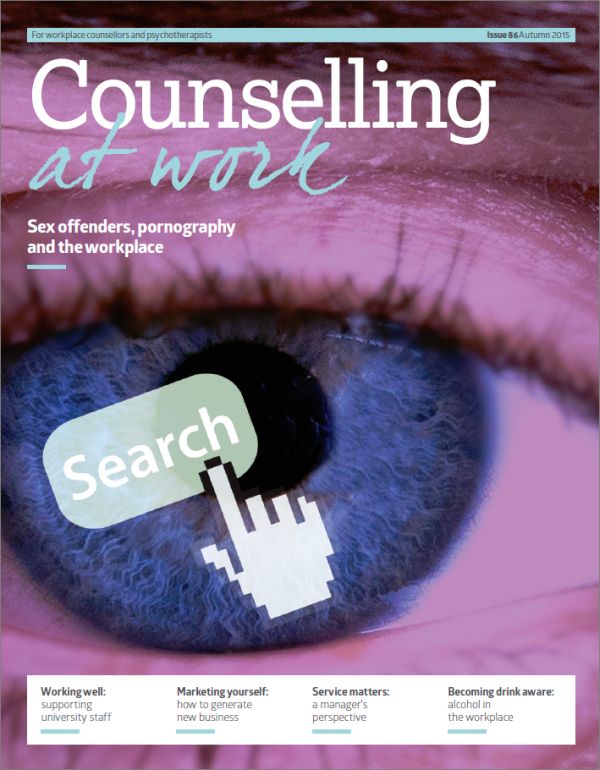In this issue
Features
Sex offenders, pornography and the workplace
How would you work with a sex offender? Juliet Grayson, of StopSO, challenges some misconceptions and offers advice
Working well
Improving staff psychological health and wellbeing at the University of Leeds is the work of Sally Rose and Nicola Neath. They outline the interventions that help to support a psychologically healthy workforce
Marketing yourself
Ruth Clowes explains how best to go about promoting your practice and raising your profile
Service matters
Cindi Bedor reflects on the value of what cannot be measured in her organisation
EAP matters
Andrew Kinder outlines some key steps to developing yourself as an EAP counsellor
Regulars
The bigger picture
Lead Advisor, Workplace Rick Hughes on the latest workplace news
Workplace matters
Dr Sandi Mann – That problem called ‘bullying’
Cyberwork
Dr Kate Anthony – Congruency and the art of omni-channeling
Inside the organisation
Don Shenker of the Alcohol Health Network, talks to Counselling at Work

A pdf of this issue is available in the Counselling at Work archive
First words
We never know what our clients will bring when we meet them for the first time. Beginning with an issue that feels ‘safe’, our clients can go on to reveal the darker, shameful or unspoken stories of their lives.
Disturbingly, the National Crime Agency has said that there are as many as fifty thousand people in the UK viewing indecent images of children and that it’s a growing problem.1 Regular news stories about child sex abuse have me hovering over the ‘off’ switch in an attempt to protect young ears from news they’re not ready to hear and questions I’m not ready to answer. Speaking to some primal part of me to protect, I notice my wish not to know and to distance myself from all this. It’s tempting to think this has nothing to do with the workplace, except it does.
Juliet Grayson’s challenging article, ‘Sex offenders, pornography and the workplace’, sheds light on the extent of this. Access to the internet means that people are regularly accessing pornography at work, and the fact that employers now have policies on this seems to have made little or no impact on an employee’s willingness to access it. A client might ‘know they’ve crossed a line when they start looking at child pornography at work’, writes Juliet, but finding someone who’s trained and sufficiently skilled to help them stop is not easy.
This led Juliet and her colleagues to set up the Specialist Treatment Organisation for the Prevention of Sexual Offending (StopSO), an organisation that provides psychotherapy and counselling for people at risk of sex offending or reoffending. This work is not for all therapists, but Juliet provides a convincing case for why we need therapists able to work with those people in society who are at risk of sex offending, before they do so. It’s not an area I recall being covered in Counselling at Work before and, of course, workplace practitioners are not ‘normally’ expected to have this expertise. But if you should end up sitting with a client who is at risk, Juliet’s article offers some guidance to help you and your client and keep yourself practising safely.
‘Working well’, by Nicola Neath and Sally Rose, brings to the fore the role their service plays in providing psychological support to staff at the University of Leeds to help them live and work well. It’s an impressive portfolio of counselling, training and support, and their enthusiasm for working upstream with their organisation and developing working relationships across the university is evident. If you have thoughts about this article or if you are inspired to write an article about your own service and the work you’re involved in, do get in touch.
Marketing ourselves doesn’t come naturally for all therapists, but BACP’s Ruth Clowes encourages us to think about how we might launch our own campaign. Her practical guide recommends ways we can create new opportunities in our area, and work with local businesses. Staying with the marketing theme, Andrew Kinder identifies some key steps for counsellors looking to extend their portfolio of work as an affiliate counsellor in ‘EAP matters’. If you have experience of this that you’d like to share with readers, or if you find these articles helpful in generating new work, do let me know.
‘How much do you drink a week?’ is a question often asked by our health professionals and, apparently rarely answered truthfully. Don Shenker of the Alcohol Health Network (AHN) talked to me about how the network is a win-win for employers and employees, and why being drink aware is vital for behaviour change to occur. Inadvertently, employers themselves can collude, and this poses one of the challenges for staff looking to reduce their consumption. In my career, I’ve worked for two blue chip companies that opened a bar for staff at midday, and this was ‘normal’. If I were a betting woman, I’d put money on it that that’s not happening today. However, ‘drinks after work’ remain a well-established form of social glue, and hitting team targets is often celebrated with a trip to the pub or ‘Friday drinks’, which can contribute to a workplace drinking culture.
Over the summer, a new networking group of Workplace managers met in London to provide mutual support and share experience. Aware of an absence of ‘a manager’s perspective’ in Counselling at Work, I welcome Cindi Bedor, who leads a busy service in an acute hospital, and offers her thoughtful reflections in the first of a new series, ‘Service matters’. ‘Offering constancy in today’s world is rare’, writes Cindi, capturing something of why and how the quiet work of holding a therapeutic presence for our clients and our organisation has such potency.
Whatever your interests, I hope you’ll find something in this issue that speaks to you and supports you in your work. The role we play as a skilled resource for the workforce holds enormous potential to have a positive influence on society. When we forge a stronger sense of community as workplace specialists, we can be stronger in our practice, for our clients and our organisations. If you’ve read something you’d like to comment on, or if you feel that you have a potential article idea and you’d like to add your voice to the community of practitioners who write for Counselling at Work, do drop me a line.
Nicola Banning
Editor
Counsellingatwork@bacp.co.uk
References
1 National Crime Agency. http://www. nationalcrimeagency.gov.uk/news/469-nca-director-general-calls-for-wider-debate-on-tackling-indecent-images-of-children. (accessed 30 September 2015)
